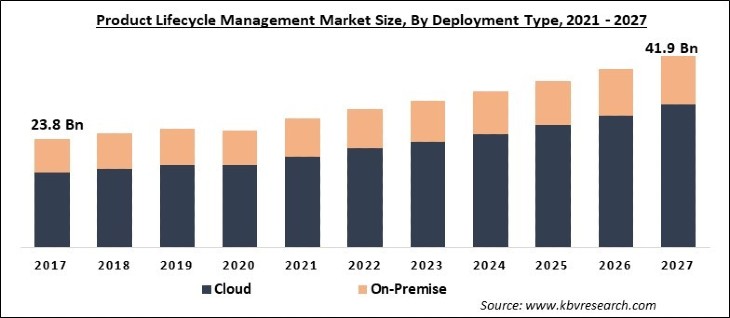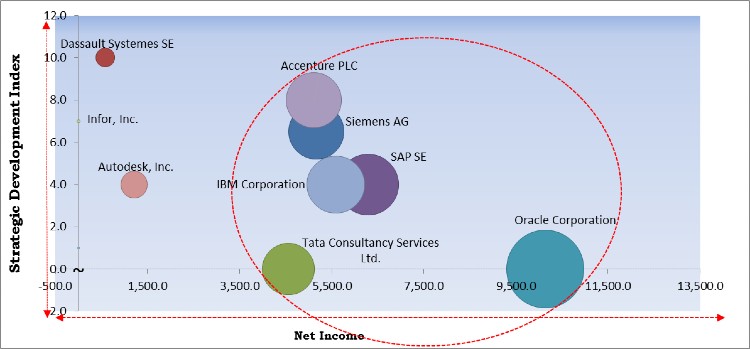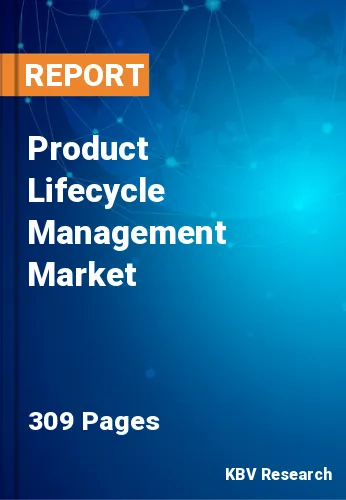The Global Product Lifecycle Management Market size is expected to reach $41.9 billion by 2027, rising at a market growth of 6.8% CAGR during the forecast period. Product lifecycle management (PLM) is considered as the systematic management of a product when it moves across various crucial stages of its product life that include development & introduction, growth, maturity, and decline. This whole process also includes product manufacturing and marketing. Through this approach, companies can make informed business decisions, from determining prices and product promotion to expansion or even cost-cutting.
The demand for product lifecycle management software is anticipated to boost in the coming years due to the factors like increasing demand for software solutions for change management, data management, bills of materials, compliance management, cost management, and governance management. With the ongoing integration of several new technologies like augmented reality, virtual reality, Industrial Internet of Things (IIoT), and additive manufacturing with PLM solutions, the demand for PLM solutions in the upcoming years. The high adoption of various cloud-based solutions by the companies to facilitate remote working and sustain in the competitive market during the COVID-19 pandemic would accelerate the demand for PLM solutions in the market. There are several PLM software providers who are estimating their users to vigorously migrate to cloud-based solutions.

The outbreak of the global COVID-19 pandemic has a different impact on various industrial verticals of the business domain. Numerous impositions like the travel ban, lockdown, and temporary ban on manufacturing units have significantly impacted various businesses. In addition, the work from home culture has become the new normal, for which companies are digitally transforming them for better operations. This digital transformation leads to the increasing demand for advanced solutions like PLM.
As numerous organizations have adopted remote working, the deployment of cloud-based solutions by these companies has surged the demand for product lifecycle management solutions in the market. The pandemic has a positive impact on the growth of the product lifecycle management market due to the high adoption of cloud-based solutions across various organizations.
In the absence of PLM solutions, a company spends more time carrying out the activities related to product lifecycle management. This requires more investment of time and cost from the company and further increasing the time to promote any product. But, by adopting PLM solutions, companies can consolidate all product data like designs, workflows, plans, and communication on a single PLM platform, which boosts the overall productivity of the organization.
Product compliance is one of the important factors in completing the process of the product lifecycle including manufacturing, sales, and service. Thus, non-compliance with regulatory standards results in critical damage to the brand image, which would affect customer retention. Though, a company can tackle this problem by using product lifecycle management solutions that help in informing the authorities about any deviation in the process.
The PLM software structure is inflexible; however, engineering teams require an adaptable solution to work in a smooth manner. It results in a cause-and-effect concept wherein the product teams consider that these PLM systems hamper the progress, and thus, they usually get workarounds that have negative effects. Users would often work remotely to the system in order to accelerate the product development process.

Based on Software Type, the market is segmented into Design & Engineering Management, Manufacturing Operations Management, Portfolio Management, Simulation, Testing, & Change Management, Quality & Compliance Management and Others. The design & engineering management segment dominated the market by obtaining the highest market share in 2020. The design & engineering procedures are changing constantly along with the constant technological advancements. The collaborative and lean product development approaches are majorly used by organizations in product lifecycle management.
Based on Deployment Type, the market is segmented into Cloud and On-Premise. The on-premise deployment type helps the companies to be more flexible to tailor their IT infrastructure. In addition, this kind of deployment also enables companies to decrease their dependency on the internet. Moreover, on-premise deployment can also assist companies in safeguarding their data from any kind of online fraud and prevent the company from potential losses. These benefits would attract more companies to adopt on-premise PLM solutions.
Based on End User, the market is segmented into Automotive & Transportation, IT & Telecom, Aerospace & Defense, Retail, Healthcare, Semiconductor & Electronics, Industrial Equipment & Heavy Machinery and Others. The automotive and transportation segment procured the highest market share of the PLM market in 2020. PLM software enables the key companies of the automotive sector to track any kind of faults in automobiles and reply to customer concerns, and thus, minimizing the product dispatch time in the field. Along with extracting the product information from engineering systems, applications, and custom databases, PLM software also helps in tracking the functionality across the product lifecycle and thus, enabling the key players of the automotive industry to detect and solve any core issues negatively impacting the customer experience.
| Report Attribute | Details |
|---|---|
| Market size value in 2020 | USD 25.6 Billion |
| Market size forecast in 2027 | USD 41.9 Billion |
| Base Year | 2020 |
| Historical Period | 2017 to 2019 |
| Forecast Period | 2021 to 2027 |
| Revenue Growth Rate | CAGR of 6.8% from 2021 to 2027 |
| Number of Pages | 309 |
| Number of Tables | 424 |
| Report coverage | Market Trends, Revenue Estimation and Forecast, Segmentation Analysis, Regional and Country Breakdown, Competitive Landscape, Companies Strategic Developments, Company Profiling |
| Segments covered | Software Type, Deployment Type, End User, Region |
| Country scope | US, Canada, Mexico, Germany, UK, France, Russia, Spain, Italy, China, Japan, India, South Korea, Singapore, Malaysia, Brazil, Argentina, UAE, Saudi Arabia, South Africa, Nigeria |
| Growth Drivers |
|
| Restraints |
|
Based on Regions, the market is segmented into North America, Europe, Asia Pacific, and Latin America, Middle East & Africa. The Asia Pacific is anticipated to register promising growth rate during the forecast period. The ongoing infrastructure development and industrial expansion, especially in developing countries like India and China, is projected to augment the growth of the product lifecycle management market in this region. Various large enterprises in the Asia Pacific, operating across numerous industry verticals like electronics, automotive, aerospace & defense, and telecommunications, are increasingly aiming at the transformation of their engineering procedures and product development operations and thus, highly implementing PLM tools. These trends are fueling the growth of the regional product lifecycle management market during the forecast period.

Free Valuable Insights: Global Product Lifecycle Management Market size to reach USD 41.9 Billion by 2027
The major strategies followed by the market participants are Partnerships. Based on the Analysis presented in the Cardinal matrix; SAP SE, Tata Consultancy Services Ltd., Oracle Corporation are the forerunners in the Product Lifecycle Management Market. Companies such as Dassault Systemes SE, Autodesk, Inc., Infor, Inc. are some of the key innovators in the market.
The market research report covers the analysis of key stake holders of the market. Key companies profiled in the report include SAP SE, Oracle Corporation, Siemens AG, Dassault Systemes SE, IBM Corporation, Hewlett Packard Enterprise Company, Accenture PLC, Autodesk, Inc., Tata Consultancy Services Ltd. and Infor, Inc.
By Software Type
By Deployment Type
By End User
By Geography
Companies Profiled
The global product lifecycle management market size is expected to reach $41.9 billion by 2027.
PLM solutions help in boosting productivity are driving the market in coming years, however, Inflexible PLM systems result in the wastage of time or expensive workarounds limited the growth of the market.
SAP SE, Oracle Corporation, Siemens AG, Dassault Systemes SE, IBM Corporation, Hewlett Packard Enterprise Company, Accenture PLC, Autodesk, Inc., Tata Consultancy Services Ltd. and Infor, Inc.
The pandemic has a positive impact on the growth of the product lifecycle management market due to the high adoption of cloud-based solutions across various organizations.
The cloud segment acquired the maximum revenue share of the product lifecycle management market in 2020 and is anticipated to witness a significant growth rate during the forecast period.
The simulation, testing, and change management segment is projected to witness the fastest growth rate during the forecast period.
Our team of dedicated experts can provide you with attractive expansion opportunities for your business.

